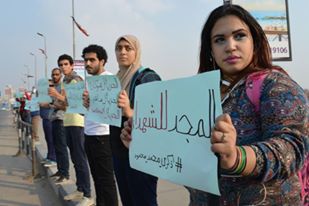Latest NEWS
- Aswat Masriya, the last word
- Roundup of Egypt's press headlines on March 15, 2017
- Roundup of Egypt's press headlines on March 14, 2017
- Former Egyptian President Hosni Mubarak to be released: lawyer
- Roundup of Egypt's press headlines on March 13, 2017
- Egypt's capital set to grow by half a million in 2017
- Egypt's wheat reserves to double with start of harvest -supply min
- Roundup of Egypt's press headlines on March 12, 2017
Nine Mohamed Mahmoud anniversary detainees remain in custody

Activists stand on 6th of October bridge in Cairo on the fourth anniversary of Mohamed Mahmoud events on 19 November, 2015 . ASWATMASRIYA/Asmaa Gamal.
CAIRO, Nov. 23 (Aswat Masriya) - An Egyptian court accepted on Monday the prosecution's motion to remand in custody nine people arrested for "illegal assembly" and "protesting without a permit," while commemorating the fourth anniversary of deadly protests in an iconic Downtown Cairo street.
On Saturday, prosecutors had ordered their detention pending investigation. A day later, a judge decided to release them on EGP 10,000 bail each but prosecutors quickly appealed the decision and the appeal was viewed and accepted in court today, keeping them in detention.
According to prosecutors, the nine currently in detention belong to the April 6 Youth Movement, the group was once credited for being a significant force behind triggering the 18-day uprising that ousted Egypt's 30-year President Hosni Mubarak. It has since been subjected to a fierce smear campaign before being banned by court order in 2014. Its first leader Ahmed Maher has been jailed for months.
Fatal clashes on Mohamed Mahmoud Street four years ago in the tumultuous aftermath of the January 2011 uprising, became known as the Mohamed Mahmoud events, a heart-rending memory for many young Egyptians whose dreams for real change were swiftly being dashed.
Today, the walls of Mohamed Mahmoud Street are an open gallery showcasing graffiti of the faces of those killed in the protests, pointing the finger of blame on all those who took power in the past five years.
Last Thursday, Nov. 19, which coincided with the fourth anniversary of Mohamed Mahmoud, participants built a human chain on Six of October bridge, a main artery in Greater Cairo, carrying hand-written signs remembering the victims. One of them read "glory to the martyrs" and another "write on the walls of the cell, imprisoning revolutionaries is a disgrace and a betrayal."
Ahmed Hefny, the prosecutor at Cairo's Qasr al-Nil neighbourhood previously told Aswat Masriya that the detainees are accused of disrupting traffic, assembling, disseminating leaflets and protesting without a permit.
Egypt's latest protest law has been widely criticised by domestic and international human rights organisations which say it violates international standards that allow peaceful protests. But many, mostly youth, have been detained and convicted for violating it since its introduction in November 2013.
The clashes on Mohamed Mahmoud Street erupted on November 19, 2011, and continued for five days. Security forces clashed with protesters opposing the transitional rule of the Supreme Council of the Armed Forces (SCAF) in violence that left 50 people dead.
At the time they were the deadliest clashes since the January 2011 uprising. Their significance was accentuated by the proximity of the violence to Egypt's interior ministry headquarters just blocks away.
The protests also marked the growing rift that was starting to show between different groups of protesters, with many criticising the Muslim Brotherhood for abandoning the "revolutionaries" as they were preoccupied with campaigning for parliamentary elections that were held over several months from 2011-2012. The Brotherhood snapped up 47 percent of seats in Egypt's then-bicameral People's Assembly.
On the anniversary of Mohamed Mahmoud protests last year, 48 protesters were arrested.










